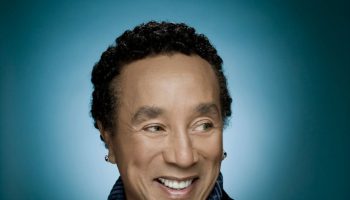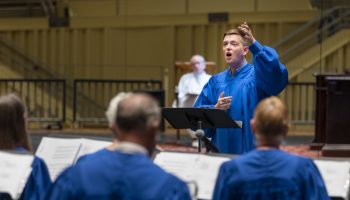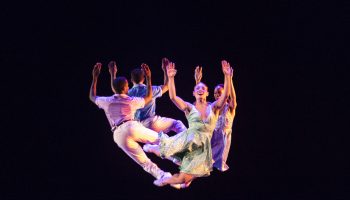NICK DANLAG – STAFF WRITER
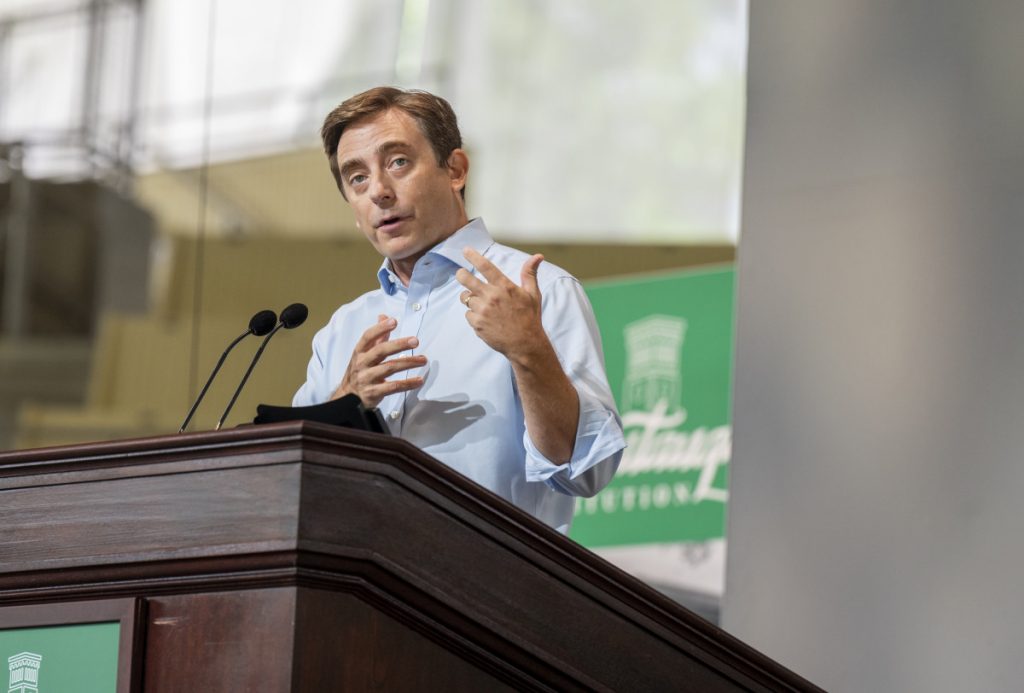
Evan Osnos spent part of his career as a foreign correspondent, reporting in places like Cairo, China and Baghdad. Once, in Myanmar, he was smuggled into the country by the rebel army in the middle of the night.
“I will tell you it would have made me very nervous, except that the soldier who was driving me spent most of the time asking me how he might get a date with Taylor Swift,” said Osnos, a staff writer at The New Yorker specializing in politics and foreign affairs.
In his many, more serious conversations abroad, Osnos found himself defending America’s virtues, saying that despite the country’s flaws and grave mistakes, U.S. citizens had a fundamental commitment to truth, law and morality. But, after he returned home in 2013, he said, quoting John Gunther, an American journalist and author, he felt like a man from Mars.
Some of the changes were subtle. When he passed by Brooks Brothers, a men’s clothing store, he noticed some of the suits in the window had an American flag pin pre-implanted in the lapel. Osnos had never seen such a pin on one of their suits before, so he reached out and asked the company, who said they started doing it in 2007.
“I did notice that 2007 was the year in which Barack Obama was getting lambasted for not wearing a flag pin in his lapel,” Osnos said.
Other changes were more wide-reaching. He noticed 9/11 altered American’s perceptions, such as a poll in 2016 finding that on average, people thought the U.S. population is one-sixth Muslim, while it is, in fact, one-one hundreth. He was also shocked at how the country viewed gun control.
“As a country, somehow we had come to live with the phenomenon of public shootings in our most vulnerable places, in schools, in public areas,” Osnos said. “Even though they were happening on average nearly three times as often as they had been the year I went abroad.”
But Osnos’ biggest surprise was how much less faith people had in law and politics.
“Of course, the notion of a shared truth — mental commons we might call — had fractured before our eyes, and we were seeing it play out in our politics in 2016, and eventually, in 2020,” Osnos said. “But the signs of what we were seeing were very visible to us long before the COVID pandemic, before the murder of George Floyd.”
Osnos asked himself if he had been wrong all those years when he told people in other countries about American values. So, Osnos went on the road back to places he lived before, to find out what Americans thought, and what was being done to reverse these trends toward mistrust.
Those travels informed his latest book: Wildland: The Making of America’s Fury, which will hit shelves on Sept. 9. At 10:30 a.m. on Thursday in the Amphitheater, Osnos presented his lecture, titled “American Bedrock: Renewing the Ties that Bind Us,” concluding the 2021 Chautauqua Lecture Series and Week Nine’s theme of “Resilience.”
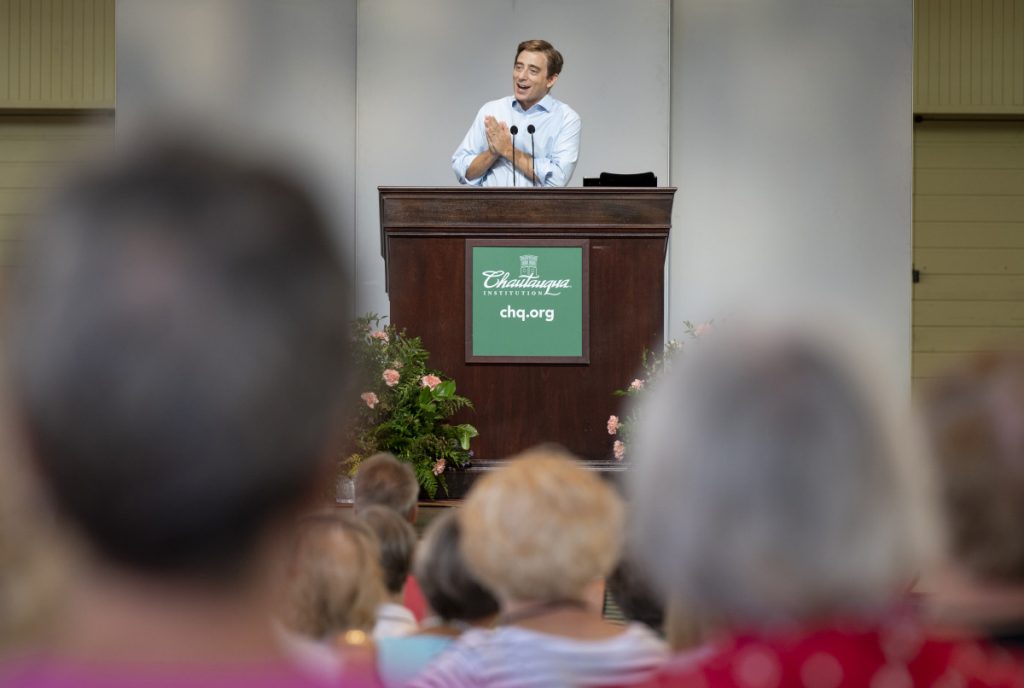
Osnos discussed the work of three people across the U.S. who are trying, and sometimes succeeding, to better America’s commitments to morality and truth. As well as working at The New Yorker, Osnos is a National Book Award-winning author of Age of Ambition: Chasing Fortune, Truth, and Faith in the New China; this was the first talk he’s given about his forthcoming Wildland. For Wildland, Osnos chose to explore places he already lived because he knew their past. The first place he went was Chicago, where a lot of his family is from.
“Chicago is the great American city. It is at once real and flawed, and in a constant permanent state of becoming,” Osnos said. “Chicago is the place, as Frederick Jackson Turner put it a century ago, where all the forces of the nation intersect. And, in many respects, I think that description stays true today, both for better and for worse.”
Chicago, Osnos said, is also one of the most segregated cities in America, with most of the white population living in the downtown area.
Enter Jamal Cole, a community organizer from the south side of Chicago. As a child, Cole was struck by how people spoke in church, how preachers could make their messages strike deeper and how he, himself, could use these same techniques.
Cole’s father, Osnos said, was addicted to drugs, and the family moved constantly.
“Statistically speaking, Jamal Cole was not set up to succeed. He was coming of age in a country in which one-third of Black men become involved in the criminal justice system. He entered the 21st century in a country that has more prisoners than farmers,” Osnos said. “But, Jamal was also allergic to the assumptions people had about him and what was possible.”
In high school, a guidance counselor told Cole to give up on going to college and to join a trade school or the military. Cole, instead, stole pages out of the counselor’s books about different colleges, and applied, Osnos said, “almost at random.” He was accepted to Wayne State College in Wayne, Nebraska.
After graduating and eventually landing a job in information technology, and then as a network administrator at a trading firm at the Chicago Mercantile Exchange, Cole volunteered on the side at the Cook County Jail and mentored juvenile offenders. He noticed that few of these young men, despite being born and raised in Chicago, had ever spent more than a few hours in the downtown area, even though they lived close by. When he asked the mentees where they were from, they would say the names of their neighborhood, and never Chicago. Cole asked why, and they said it was because there were no Black people in downtown Chicago, and they identified more with their own neighborhoods. To help each neighborhood connect with different areas of the city, Cole helped create My Block, My Hood, My City, also called M3. The organization began by taking young people to explore areas of the city they had never been before — waste treatment plants, homeless shelters and a chiropractor’s office. They even went scuba diving together. As the organization expanded, they took on more ambitious projects, such as a program where new police officers go on tours of neighborhoods guided by the young people who live there.
“A lot of the cops really don’t know the neighborhoods until they get there in a moment of crisis. This was giving both of them an opportunity to have a conversation, for some shared experience outside the confines of those moments,” Osnos said. “As he put it to me, ‘It’s a skill that neither side really has.’ ”
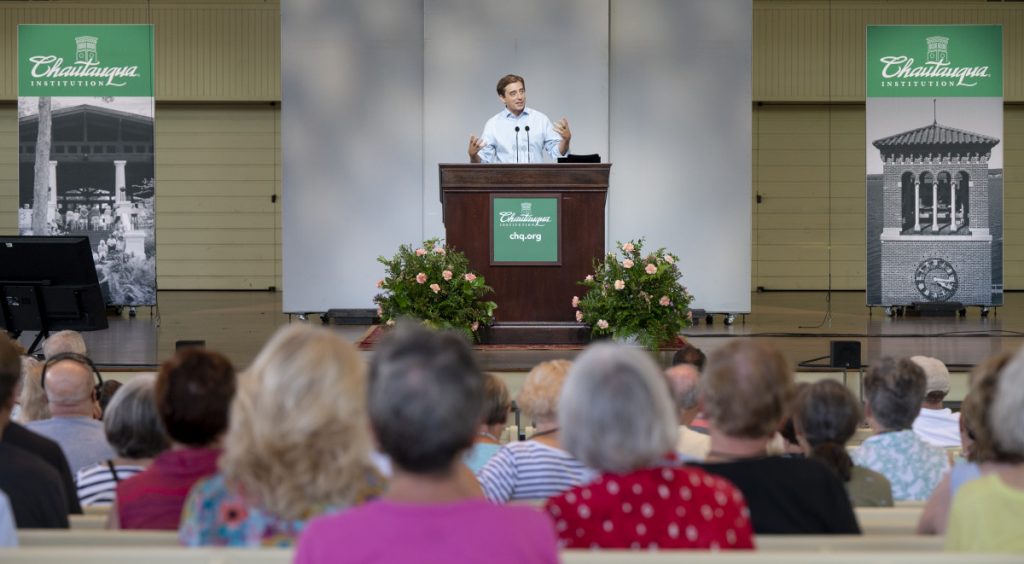
COVID-19 brought a whole host of new programs for Cole, who had to figure out how to do his work in safe ways. So Cole had the young people make wellness packages for the elderly, filled with items like hand sanitizer. M3 also partnered with a call center for seniors to train the young community members to work the phone, and if they did well, they could earn an internship.
When protests rose from all parts of Chicago after George Floyd’s murder, Cole turned to the relationships, with police and the community, he had built.
“It was no panacea, let’s be blunt,” Osnos said, “but it was, at least, a basis for some mutual understanding.”
His work even received attention from Oprah Winfrey, who gave Cole $500,000. Cole hoped to raise $1 million for M3, and ended up raising $10 million.
“To Jamal Cole, I realized, resilience is really not just fortitude, though he has that in spades,” Osnos said. “It is a strength derived from some other attributes, other muscles to use his words, like empathy and creativity, and the clarity to say with total conviction that his life deserves a greater share of what this country has to offer than he has so far received.”
The second person he discussed with was Jeffrey D. Grant, a former lawyer.
“It’s not a story that’s easy to like, necessarily,” Osnos said. “The lessons in his life force us, however, to talk pretty honestly about some of the moral questions facing this country and what it will take to solve them.”
In the 1990s, Grant owned a law firm in Westchester County.
“As a lawyer, he specialized in real estate work, in corporate work, and he regarded himself, to use his words, as an assassin,” Osnos said. “His philosophy, as he put it to me bluntly, was ‘Win. Win. Win.’ ”
In his 40s, Grant’s life began unraveling. He was becoming erratic and was addicted to Demerol, a painkiller. He stole money from his clients, and after 9/11, he falsely claimed his office was destroyed in the attacks to receive aid. When the IRS discovered his lies, he served 14 months in prison.
“Grant had been disbarred, largely cut off from his old world — and that, he will tell you, saved his life,” Osnos said. “He had undergone an awakening of a kind that Bryan Stevenson, civil rights lawyer, describes as the power of getting proximate, getting close to people who are vulnerable, people who are suffering, people who are living a life outside of your own.”
After prison, he volunteered at the same rehab organization that helped him, and eventually became an executive of Family Reentry, an organization that helps people coming out of prison and their families, and later earned a degree in divinity at Union Theological Seminary in Manhattan.
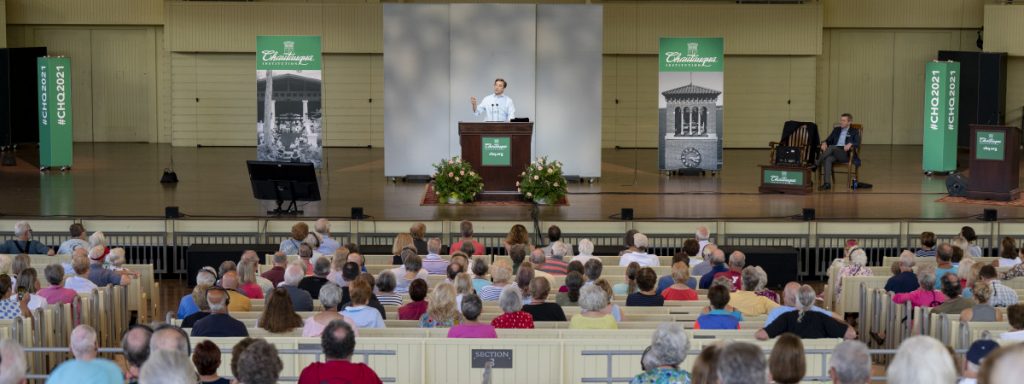
“Jeff Grant, in one form or another, had come to recognize that the problems in his life were not about Demerol; they were not about the events of 9/11. They were born of deeper fault lines in himself and in the culture that he represented and he inhabited,” Osnos said. “And frankly, one that is common in many of the most powerful corners of American life: The instinct to win, win, win.”
The third person Osnos discussed was Katey Lauer in West Virginia. The political makeup of the state changed drastically while Osnos was abroad, from three generations of Democratic control, to the state voting mostly for President Donald Trump in 2016.
“It forces people to ask: What would it take to restore confidence in government in rural parts of this country in places where people feel as if they have become, to use Jamal Cole’s word, disconnected?” Osnos said.
Lauer was an environmental activist who had become demoralized after she was routinely outmatched and outspent. In one instance, the mining industry sponsored a program called “Coal in the Classroom.” In this program, they had a workbook on economics for children decorated with “a smiling lump of coal with arms and legs opening the door to a bank.”
“It was a wake-up call for her. She said, ‘We’re done knocking on the door of the Capitol. We need to win positions of power ourselves,’ ” Osnos said.
Although her state went for Trump in the presidential election, Lauer noticed that all the counties had chosen Sen. Bernie Sanders in the Democratic primaries. She also noticed how Democrats in Washington were mischaracterizing West Virginian voters, simply writing them off as ignorant. These points showed Lauer that West Virginia was turning against mainstream politics.
Lauer was reassured this was the case in February 2018 during statewide teacher strikes. West Virginia paid teachers some of the lowest wages in the country, and the striking teachers demanded a 5% raise. When they succeeded, the strike spread to other Republican states and even other industries. Osnos said 2018 saw the most strikes since President Ronald Reagan was elected. So Lauer created the organization West Virginia Can’t Wait, whose goal is to go against mainstream politics all the way down the ballot.
“They avoided the term progressive,” Osnos said, “because they knew that in West Virginia, that would hold them back. There were people who just recoiled from the language of progressive politics. They said, ‘Let’s focus instead on the matter on the page. Let’s focus on the details of the issues, not on the labels we give ourselves or give others.’ ”
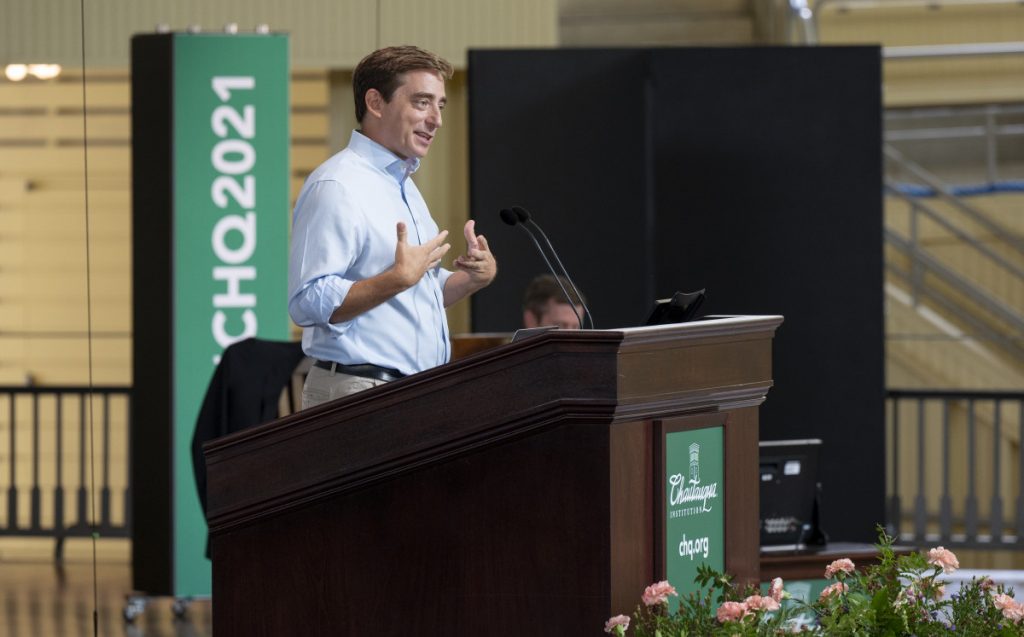
The organization found 93 candidates, half of whom were under 40, for races across the state and broke the state’s record of most small donors with 2,449. In contrast, the incumbent governor had 13.
“It will not shock you to discover that they eventually ran up against the limits of what might be possible at this moment in West Virginia politics in the 2020 election,” Osnos said. “The incumbent Gov. Jim Justice prevailed, and Donald Trump expanded his lead.”
Lauer was surprised that despite the organization’s losses, 18 more people committed to run for office within the state.
“She said one of the dimensions of the culture war that we’re fighting in this country is urban versus rural, and the idea that we should and can write people off; that there are ‘our’ kinds of people and ‘their’ kinds of people,” Osnos said. “And as long as we believe that, she said, we are putting ourselves into warring tribes, and we will never be able to reconcile.”
So, was Osnos wrong, or lying, when told people in other countries about American values?
“By the end of this process, I realized I was writing this for my kids, actually — because I needed them to see and to know of a period in which I do think we lost sight of our moral aspirations, our moral ambitions,” Osnos said. “We were drifting broadside to the judgments of history. And I think we have set out, in fact, to find our way back. And that gives me confidence.”
As part of the Q-and-A session, Chautauqua Institution President Michael E. Hill asked Osnos how people should go about looking at different countries and cultures through a different lens, especially with the recent Taliban takeover of Afghanistan.
“There is a natural temptation to want to organize our world into convenient assignments of guilt and innocence,” Osnos said.
He also said the war in Afghanistan had an impact on American soil, especially small towns, which had more than twice the deaths of soldiers per capita than big cities.
“This is the result of a project that has been limping along longer than it should have,” Osnos said. “And we allowed it to in this country, partly because this was not a war fought by all Americans. It was a war fought by a tiny sliver — less than one-half of 1% of Americans — and the rest of us didn’t have to bring the usual political pressure to bear.”


